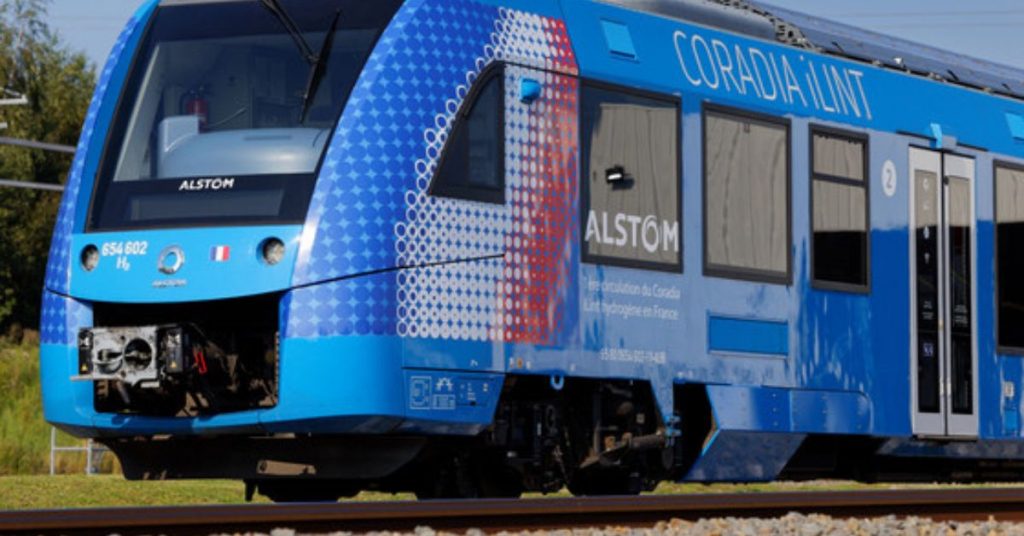Germany has more hydrogen-powered trains in use than any other country, but regular operation has been hit by snags leading to the temporary replacement of the largest fleet by older diesel trains.
In mid-December 2024, train manufacturer Alstom —first to build hydrogen-powered passenger trains with its iLINT design, launched in 2014 at the InnoTrans trade fair in Berlin — had to withdraw most of the largest fleet it has supplied in Germany for urgent rework and upgrades. The fleet of 27 iLINT trains, known as Class 554, in Germany were bought as part of a 2019 contract worth over $500 million for use on the Taunus network of regional routes north of Frankfurt am Main. The contract included the supply of hydrogen to power the trains; Alstom’s share for the trains was around $350 million.
The iLINT trains have been in regular service since 2023, but intensive use has demonstrated that they do not offer the expected reliability. Alstom has attempted to improve reliability by producing additional spare parts but now intends to completely overhaul each train. The entire fleet will be partly rebuilt at Alstom’s expense, with more powerful hydrogen fuel cells and additional hydrogen storage being fitted. Eighteen of the 27 trains will be withdrawn initially for repairs, with nine remaining in use on the RB12 Königstein-Frankfurt route. Six of the hydrogen trains are scheduled to work daily. A replacement fleet of 16 leased older LINT diesel multiple-unit trainsets, funded by Alstom, will operate other routes in 2025 while the iLINT fleet is overhauled.
The decision to fit large fuel tanks also reflects problems encountered accessing hydrogen supplies. While hydrogen provider Infraserv Höchst is rail connected, the switching movements required have proven more time consuming than expected, in part because access into and out of a secure chemicals plant is involved every time.
Frankfurt regional transport authority RMV, which owns the fleet and funds the operation, has been publicly highly critical of Alstom. The authority says the two years of experience with the hydrogen fleet has “done a disservice to [public] trust in new traction technology.”.
As the first major manufacturer to build hydrogen-powered trains, Alstom established an exclusive supply agreement with Canadian fuel cell manufacturer Hydrogenics (since 2019 part of the larger Cummins group) to produce fuel cells for the rail industry. Outside Germany, Alstom has an order from Northern Italian regional passenger operator Trenord for six hydrogen-powered Coradia Stream trains and is working with some French regions to introduce the technology there. The prototype iLINT trains have been tested since 2015 in several European countries, as well as in Canada and Saudi Arabia. However, no further orders have been forthcoming.
In mid-December, a third hydrogen fleet ordered for use in Germany, and the first built by Siemens, entered service north of Berlin. Within a fortnight, the trains had been withdrawn from service, following problems obtaining reliable supplies of hydrogen. East German regional operator Niederbarnimer Eisenbahn (NEB) introduced its small fleet of seven Siemens Mireo Plus H hydrogen-powered, two-car units alongside a larger fleet of 31 Mireo Plus B battery EMU (BEMU) versions. This was the first regular service for the Siemens hydrogen trains.
The Berlin/Brandenburg transport authority VBB, which funds the NEB services, announced in the last week of December that the NEB hydrogen fleet would be temporarily replaced by the new BEMUs and older DMUs because of the hydrogen issues. The supplier, German energy company Enertrag, was unable to provide sufficient hydrogen to the NEB maintenance shop at Basdorf, north of Berlin, using road tankers. A hydrogen fuel storage tank system is planned longer term at Basdorf but is not yet operational. Removal of the hydrogen-powered trains led to short-notice service cancellations. These continued for several weeks until mid-January, when hydrogen deliveries became reliable enough to re-introduce some of the trains.
Siemens also has a demonstrator hydrogen Mireo Plus H train; this will begin trial passenger service during 2025 in Bavaria on routes south of Augsburg. Transport authorities in Bavaria, unlike the neighbouring state of Baden Württemberg (which has ruled out hydrogen technology on cost grounds), envision some future role for hydrogen powered trains but have yet to commit to an order. This test operation will be supported by specially built road trailers that store and pump the hydrogen into the train.
Tags: Alstom, Germany, Hydrogen



Recent Posts
Report Highlights Pathway for Electrifying Nigeria’s Container Trade Sector
South Korean Company YPP Plans to Invest up to $3.1 Billion in Green Hydrogen Production in Kazakhstan
WattEV Expands Electric Truck Charging Network with Three New Depots in California
Anemoi Develops New Method to Accurately Measure Wind-Assisted Propulsion Benefits
Navigator Holdings and Amon Maritime Form Joint Venture for Ammonia-Fuelled Carrier Fleet
Hygenco Commissions Maharashtra’s First Green Hydrogen and Oxygen Facility to Power STL’s Net Zero Goals
India Invites Second Round of R&D Proposals Under ₹4 Billion Green Hydrogen Mission
BMTC Adds 148 Tata Electric Buses to Bengaluru Fleet, Strengthens Green Mobility Drive